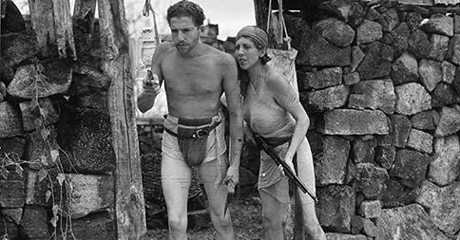|
|
Reviewed by Glenn Erickson
And now for the strangest story of the day. It involves daring adventure, pioneers in a savage environment, conflicting ideologies, class discrimination, sexual license, megalomania, murder and horrible death. It's all true, and it all took place at "the end of the Earth", 85 years ago. Dayna Goldfine and Dan Geller's documentary The Galapagos Affair: Satan Came to Eden is about a true-life group of 20th-century Robinson Crusoes. It involves no fuzzy speculations, questionable interviews or 'dramatic recreations'. The main players kept diaries and took photos, and even some motion picture film. Although completely non-fiction, this great docu raises questions about the search for paradise, and how far people will go to find it.
The Galapagos Affair frequently seems too strange to be real. In 1929 Germany, the doctor Friedrich Ritter quits his practice. Both he and his lover Dore Strauch journey all the way to the uninhabited island of Floreana in the remote Galapagos, five hundred miles off the coast of Ecuador and home to large numbers of Marine iguanas. A rigorous disciple of Nietzsche, Ritter hates people, society and civilization, and is determined to find a perfect way of living, independently and in solitude. Both Ritter and Strauch are married to others; they just leave their former lives behind.
At the time the main islands of the Galapagos have only a few a small towns, an army outpost and a governor. The land is just beginning to be homesteaded by a few Ecuadorians and, interestingly, Norwegians. Doctor Ritter is aware of the rising influence of fascism, but his motivation to hide himself on an uninhabited island is mainly to be to isolate himself from the evils of society. Dore is made unhappy by Ritter's harsh criticism and cruel edicts. She feels closer to her burro than her unconventional mate. Dore's loneliness is broken after only a couple of months: an American millionaire conducting a yearly scientific cruise/vacation discovers and befriends the couple in their 'new Eden'. His staff takes photos; soon afterwards, newspapers around the world pick up on the novelty story of a new Adam and Eve.

That publicity brings more Germans to paradise. Self-styled pioneers Heinz and Margret Wittmer want only a peaceful place to live where their boys won't have to go to war as did their father. Margret is a busy hausfrau, and soon their cabin is nicely decorated with the comforts of home. The angry Friedrich considers the Wittmers to be bourgeois invaders of his intellectual domain, interrupting his goal of writing a major philosophical text. Margret is pregnant with her second child, and at first Dr. Ritter refuses to help deliver it.
That arrangement is relatively benign compared by a trio of newcomers that are also motivated by press reports of a new paradise. Accompanied by two lovers/consorts, 'Baroness' Von Wagner shows up and elbows her way onto a choice campsite. She then proceeds to alienate both the Ritters and the Wittmers with her high-handed airs, uncouth morals and imperious plans to become the 'Queen' of the island. She seems to hold her two companions under an odd emotional-sexual spell. (second photo) The Baroness charms the captains of visiting boats, but her neighbors bristle at her haughty attitude. Disputes break out, along with threats of violence.
When the governor visits to investigate stories of fights and rights disputes, the Baroness talks him into granting her four square miles of Floreana to build a glamorous tourist hotel. The other two immigrant families are allotted just a few acres. But the hotel is a pipe dream. When a drought that dries up the springs and kills most of the homesteaders' animals, the Baroness and her cohorts become more aggressive and demanding of their neighbors. The mystery of The Galapagos Affair kicks in when people begin to disappear. Various diaries record conflicting descriptions of events. A boat chartered by one of the homesteaders disappears outright. Has there been murder in paradise?
If a film documentarian's goal is to uncover an obscure but highly relevant event in the past, The Galapagos Affair is a smash success. The descendants of the (surviving) original homesteaders apparently granted the filmmakers access to a treasure of documentation -- photos, movie film, and the fascinating diaries. The evidence points to a clash of personalities living in close proximity on Floreana -- all three groups had reason to feel threatened, perhaps enough to commit murder.

We see the Wittmer's children (around 1998, I think), who still run a little hotel. The docu also takes time to interview islanders from the established Galapagos towns, to give contrast to the iconoclasts, adventurers and ne'er-do-wells that decided to seek solitude on Floreana. The town folk tell us that there is no paradise, and that being estranged from society is not a good idea.
The characters we meet could have come out of a novel. The unyielding ideologue Friedrich Ritter cruelly dominates his wife. The Baroness is a deranged sociopath with delusions of grandeur, living in a ragged shack and thinking herself a queen. Investigating further, the filmmakers confirm that the Baroness was a fraud. She had no title, and simply ran away from Germany with her two lovers, one of them her employer. Out in the wild she was the dominant partner, with the salesman becoming her main lover and her former boss a sexual slave. Newspaper accounts wildly exaggerated the tales of a 'sex goddess' and her captive lovers, rumors that the Baroness may have encouraged. She doesn't look like all that much in the photos, but she obviously had something. At her request, the California yachtsman actually filmed a silent movie starring the Baroness as an Antinea- like savage queen, inducing a newcomer to slay her lover and take his place. Was that fantasy a self-fulfilling prophecy? We even see a portion of the completed film. (third photo)
The photos and films were originally taken to document the 'big adventure', but we're still surprised at how much they make The Galapagos Affair seem like fiction. The filmmakers found only one photo of Dr. Ritter where he's relaxed and smiling. Ritter came to the island to be independent but ends up accepting all manner of gifts and supplies from the yachtsman. As he also must continue to deal with 'other people' he really never escaped society at all. Perhaps the most telling moment in the film is in an interview with an elderly resident from the town. She admits that she's no longer amused when visitors tell her, "Oh you must be so happy. You're living in paradise!"

The Galapagos Affair: Satan Came to Eden has much new footage of the islands as well, along with fascinating clippings of vintage news items and feature stories from German, American and Ecuadorian newspapers. There are even illustrations from a trashy men's magazine that stretches the facts into a lurid tale of an erotic queen and her sex slaves in a South American jungle.
The documentary plays like a suspense story. A lineup of stars -- Cate Blanchett, Sebastian Koch, Thomas Kretschmann, Diane Kruger & Connie Nielsen - recites the passages from the diaries of the settlers, making the story seem even more personal. The show even has a satisfying ending, because we feel we learn enough about the settlers to formulate our own theories of Who killed Whom.
Zeitgeist Films' DVD of The Galapagos Affair: Satan Came to Eden is a high quality enhanced encoding of this fascinating real-life docu-mystery. The interviews and the modern scenes of the islands are very handsomely filmed, and the vintage movies range from pristine to a few selections that are weaker dupes. We presume that the personnel of the millionaire yachtsman shot the movies and most of the (excellent) photos. The most amazing thing about this docu is the quality and quantity of visual documentation the filmmakers were able to gather together.
The disc has a number of deleted scenes, a Q&A session taped after a screening at Telluride, and an intriguing trailer. We're also happy to report that removable English subtitles are present as well.
On a scale of Excellent, Good, Fair, and Poor,
The Galapagos Affair: Satan Came to Eden DVD
rates:
Movie: Excellent
Video: Excellent
Sound: Excellent 5.1 and stereo
Supplements: Deleted scenes, Q&A session, trailer
Deaf and Hearing-impaired Friendly?
YES; Subtitles: English
Packaging: Keep case
Reviewed: September 7, 2014

Text © Copyright 2014 Glenn Erickson
See more exclusive reviews on the Savant Main Page.
The version of this review on the Savant main site has additional images, footnotes and credits information, and may be updated and annotated with reader input and graphics.
Return to Top of Page
|

